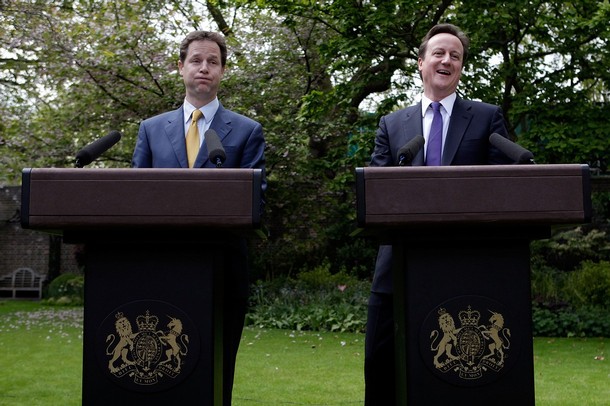
After more than a year of British hand-wringing over the status of the Special Relationship under President Obama, the shoe is now on the other foot, with some Americans wondering whether the new occupants of No. 10 Downing Street will be quite as Atlanticist.
Cameron and Clegg: Rhetoric vs. Reality
It’s true that both David Cameron and, especially, Nick Clegg have sounded calls that are worrisome to American ears. Alistair MacDonald and Jay Solomon, writing before the deal was finalized, write in WSJ:
Mr. Cameron’s Conservatives, in a move that the Liberal Democrats will almost certainly endorse, look to hedge their bets by anticipating the relative decline of U.S. power amid the rise of developing nations.Before a trip to India in 2006, Mr. Cameron wrote in a blog: "for too long, politics in this country has been obsessed with Europe and America."
For Mr. Cameron, the future means strengthening ties to the emerging giants and moving closer to old friends such as the Gulf nations, and forming what he called a "new special relationship" with India.
Mr. Cameron extols the virtues of close contact with Washington, but he and other Tory officials emphasize a "solid but not slavish" friendship that needs to be rebalanced from one tilted in America’s favor. For his part, Liberal Democrat leader Nick Clegg has criticized "the default Atlanticism" of both Labour and Conservative governments, adding in March "we still too readily put ourselves in a position of unthinking subservience to American interests."
But this strikes me as mostly a rhetorical sop to public opinion in wake of the widespread — if in my judgment grossly unfair —belief that Tony Blair was "America’s poodle" in the Iraq War. But, as former NATO ambassador Kurt Volker recently commented,
I have met a number of British Prime Ministers and Cabinet Ministers, and it is simply not in their DNA to do something just because America says so.
[…]
The fact is that then-Prime Minister Blair made his own decision: It was too risky to allow Iraq to develop weapons of mass destruction (which even France and Germany believed they had), and then possibly pass them to terrorists.
This was not only the Prime Minister’s view, it was confirmed through a vote of Parliament. The special relationship did not make Britain do anything. Rather, it gave Britain unique information and access, and Britain – Government and Parliament alike – chose to go forward. And as former Prime Minister Blair candidly and courageously told the Iraq Inquiry, he would do it again.
Not only was Blair a better spokesman for the war than Bush, but it was Blair who led a reluctant Bill Clinton to follow his own instincts and risk the domestic political consequences for going to war in the Balkans.
Yes, as Cameron and others have noted, the UK is the "junior" member in the partnership owing to the vast difference in resources the two countries bring to the table. But American presidents take the views of their counterparts in London very seriously, indeed.
Continuity
Writing on November 7, 2008 about the incoming Obama administration, I approvingly quoted Paul Heutching‘s remark that, "Obama is an American politician, and he will govern like an American president." Well, David Cameron is a British politician, and he will govern like a British prime minister.
He will, as is his duty, make sober assessments about the best interests of his nation and make his policy decisions accordingly. And — as with Gordon Brown, Tony Blair, John Major, Margaret Thatcher, and a host of others before him — he’ll more often than not find that the UK’s interests and those of the USA will overlap. On those rare instances where they don’t, however, he’ll steer his own course.
We saw this with Barack Obama. To be sure, as we have documented in great detail in these pixels over these last several months, he has paid somewhat less attention to Europe in general and the UK in particular than did his predecessor and than most of us would prefer. But, by and large, the changes in America’s foreign policy brought in by the new administration have been subtle, matters of emphasis and tone rather than substance. I would be shocked if the same weren’t true of the transition in London.
James Joyner is managing editor of the Atlantic Council. Photo: Getty Images.
Image: cameron-clegg-presser-first.jpg
